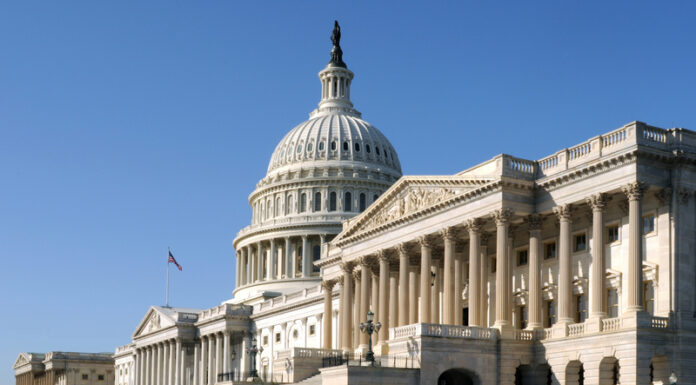Senate Parliamentarian Elizabeth MacDonough has delivered significant setbacks to President Donald Trump’s sweeping tax and spending legislation, ruling that multiple key provisions violate chamber rules and cannot be included in the budget reconciliation process. The rulings threatened to undermine Republican efforts to pass the massive bill by the July 4 deadline.
MacDonough advised senators on Sunday that several provisions in the revised domestic policy bill violate the Senate’s strict Byrd rule, which limits what can pass through reconciliation with a simple majority. The parliamentarian’s memo, released by Democrats on the Senate Budget Committee, identified numerous violations that could force Republicans to either rewrite sections or abandon them entirely.
Among the most significant casualties were two provisions specifically crafted to boost Medicaid payments to Alaska and Hawaii. Republican leaders had hoped these non-contiguous state provisions, along with other Alaska-friendly changes, would secure the vote of Senator Lisa Murkowski, who had voiced concerns over deep cuts to Medicaid and the Supplemental Nutrition Assistance Program.
The parliamentarian also struck down a central proposal to overhaul Medicaid provider taxes, which Republicans had counted on to help offset costly tax cuts. The provision would have capped states’ ability to collect federal Medicaid funding through health care provider taxes, representing hundreds of billions in potential savings that funded much of the bill’s tax reductions.
Additional rejected provisions included expanded Medicare drug-price negotiation exemptions for orphan drugs treating multiple rare diseases, blocks on Biden-era regulations making it easier for older adults and disabled individuals to enroll in Medicaid, and prohibitions on nursing facility staffing rules estimated to reduce federal Medicaid spending by $23 billion over 10 years.
MacDonough also ruled against provisions eliminating Medicaid eligibility for non-citizen adults and children, lowering Federal Medical Assistance Percentage funding for states providing health care coverage to non-citizens, and blocking federal funding for gender-transition medical care through Medicaid and the Children’s Health Insurance Program.
The rulings prompted fierce criticism from Republican senators. Senator Tommy Tuberville described MacDonough as the “WOKE Senate Parliamentarian” and called for Senate Majority Leader John Thune to “fire her ASAP.” Representative Greg Steube questioned how an unelected bureaucrat appointed by former Senate Majority Leader Harry Reid could determine what belongs in Trump’s legislation.
Despite the criticism, Thune has consistently opposed overruling the parliamentarian, viewing such action as equivalent to abolishing the 60-vote filibuster. Other Republican senators, including Lindsey Graham and John Kennedy, rejected the idea of overruling MacDonough’s decisions.
The parliamentarian did approve some Republican priorities. A proposal delaying planned cuts to provider taxes that fund state Medicaid obligations survived the review process, though the timeline was extended by one year. Provisions barring Medicare coverage for non-citizen immigrants, including refugees and asylum seekers, were deemed compliant with Senate rules.
Most notably, MacDonough determined that a provision blocking Planned Parenthood from receiving federal Medicaid funds could remain in the legislation, though Republicans revised it from a 10-year prohibition to one year to ensure compliance.
The U.S. Senate passed the “One Big Beautiful Bill” early on July 1, 2025, voting 51–50 with Vice President J.D. Vance casting the tie-breaking vote.
The bill now returns to the House of Representatives for a final vote to approve the Senate’s changes, which include removing or revising several provisions struck down by the parliamentarian. If the House passes the amended version by a simple majority, the legislation will proceed to President Trump’s desk for his signature. However, if the House rejects the Senate’s revisions, a conference committee will be formed to reconcile differences between the chambers, requiring both the House and Senate to vote again on a compromise bill. Speaker Mike Johnson has indicated he aims to schedule a swift vote within days to meet the administration’s July 4 deadline, though Republican leaders face potential opposition from hardline conservatives critical of the Medicaid provisions retained in the final package.
The Congressional Budget Office determined that the House-passed version would add up to $3 trillion to the federal deficit over the next decade, despite Republicans previously claiming $1.6 trillion in spending cuts. House Speaker Mike Johnson indicated the Senate’s Medicaid ruling “doesn’t make it easier” to meet the July 4 deadline but expressed continued optimism about passage.
Democratic senators celebrated the parliamentarian’s decisions as victories against what they characterized as harmful provisions. Ranking Member Jeff Merkley described continued efforts to challenge provisions in what he termed the “Big, Beautiful Betrayal of a bill” that violates Senate rules and hurts families and workers.
The parliamentarian’s ongoing review under the so-called “Byrd Bath” process continues to scrutinize additional provisions. Any section ruled out of order with Senate rules must be stripped or the entire legislation becomes subject to the 60-vote threshold, which Republicans cannot achieve with their current majority.








